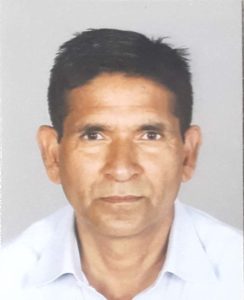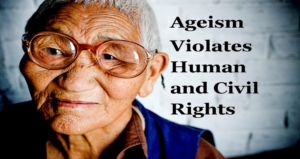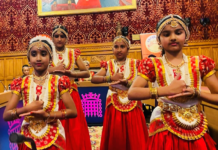By Awadhesh Kumar Tewari
 Older people as with every other section of the population have human rights as they are inherent to all human beings. To date there has been a lack of discussion and articulation of the human rights of older people in nationally and internationally.
Older people as with every other section of the population have human rights as they are inherent to all human beings. To date there has been a lack of discussion and articulation of the human rights of older people in nationally and internationally.
In this condition we need to improve the protection of older person’s rights so that older people can fully enjoy their human rights and so we can continue to participate in and contribute to society as we grow old.
What are Human Rights?
Human rights are rights which belong to every individual simply because we are human beings. It does not matter what are nationality, place of residence, sex, age, national or ethnic origin, colour, religion, language, or any other status is.
Human rights are about human dignity as opposed to simply human needs or charity and embody the basic standard without which people cannot realise their inherent human dignity.
We are all equally entitled to our human rights without discrimination
What are international human rights law?
International Human Rights Law refers to both European and UN international human rights instruments. It lays down obligations of governments to act in certain ways or to refrain from certain acts, in order to respect, to protect and to fulfil human rights and fundamental freedoms of individuals or groups.
Respect means: that States must refrain from interfering with or curtailing the enjoyment of human rights.
Protect requires: States to protect individuals and groups against human rights abuses.
Fulfil means: that States must take positive action to facilitate the enjoyment of basic human rights.
International human rights law is primarily made up of International Human Rights Treaties and once ratified; each State must ensure that the Treaty is compatible with its domestic law. Where a mechanism has failed under domestic law in relation to a human rights abuse, an individual may rely on international law mechanism to seek redress.
Why is a Convention required for Older People
The Universal Declaration on Human Rights states that “ all human beings are born free and equal in dignity and rights”. This equality does not change with age: older men and women have the same rights as people younger than themselves.
The rights of older people are embedded in international human rights conventions on economic, social, civil and political rights, yet are not made specific.
Our rights do not change as we grow older. What does change is that older women and men are considered inherently less valuable to society at the same time, as people get older, they face increasing barriers to their participation, become more dependent on others and loss some or all of their personal autonomy. These threats to their dignity can make them more vulnerable to neglect, abuse and violation of their rights.
Age discrimination and ageism are tolerated across the world. Older women and men experienced violations of their rights at family, community and institutional levels.
Older people face very specific threats to their rights in relation to age discrimination.
Age discrimination: is when someone is treated differently, with an unreasonable impact, simply because of their age. It is a violation of older people’s right. Upper age limit on credit or micro-finance that prohibit older people accessing finance, or indirect, such as not collecting data on HIV infection over age of 49.

Ageism: is the stereotyping and prejudice against older people that can lead to age discrimination. Research by Yale University showed that negative stereotypes of older people in the US had a harmful impact on older people’s memory, balance and even how long they lived for. At the other extreme, older people, especially women, can be accused of witchcraft because of age and gender stereotypes and then forced out of their homes or even murdered.
Multiple discrimination: The discrimination that older men and women face is also complex, often based two or more factors, such as age and gender, ethnic origin, where they live, disability, poverty, sexuality, HIV status or literacy levels. Older women are particularly vulnerable to discrimination based on both age and gender. The impact of gender-based discrimination against younger women is carried into old age and unless addressed continue from one generation to another.
Current situation of older people
Nowadays, the number of persons aged 60 and over is increasing at an unprecedented pace, anticipated to rise from its current 740 million to reach one billion by the end of decade. Unfortunately the increase in numbers has also shed light on the lack of adequate protection mechanisms, and on the existing gaps in policies and programmes to address the situation of older persons.
Today, two-thirds of the world’s older people live in low-and middle-income countries and this proportion will rise to 80% by 2050.
Report of Human Right watch
Millions of older people suffer human rights violations every year, ranging from discrimination and social and political exclusion, to abuses in nursing facilities, neglect in humanitarian settings, and denial and rationing of health care. Most of these abuses go undocumented and the perpetrators unpunished. With 2 billion people—a quarter of the world’s population—expected to be over 60 years of age by 2050, the rights of older people cannot be ignored. Human Rights Watch is setting out to make an impact for change for older people today and in the future.
Ways
- Shielding elderly people from abuse in hospital
- The deaths of elderly people should be investigated if there is evidence of abuse or neglect
- Recognising abuse of elderly people in care homes
- Human rights protect older people’s interests during the closure of care homes
- Human rights can help to keep couples together in care homes
- Human rights duties may apply to privately-run care homes performing a public function
- ‘Do Not Resuscitate’ (DNR) Orders may not be imposed without consent.
Courts Decisions
- Thousands Of Do Not Resuscitate (DNR)Orders Could Be Breaching Patients Human Rights
- By Adam Wagner
- 2nd May 2016 252 Shares
- The Telegraph reports todaythat around 40,000 ‘Do Not Resuscitate’ (DNR) orders are being imposed on dying patients each year without families being told. And in many cases, there is no record of the patient being consulted either. This is potentially in breach of two recent landmark human rights judgments.
- A DNR orderis a decision is taken in hospital before a person dies that, if they stop breathing or their heart stops beating, they will not be actively resuscitated – in other words, kept alive. In recent times, the courts have been very clear that patients and sometimes relatives must be consulted in order for hospitals to comply with human rights laws.
- In the David Tracey case, [2014] EWCA Civ 33 the Court of Appeal said that where possible, patients must be properly consulted before doctors apply a DNR notice, or else their right to private life, protected under Article 8 of the European Convention on Human Rights, would be breached – see the UK Human Rights Blog.
- Following from the Tracey case, in 2015, the High Court said in case Winspear v City Hospitals Sunderland NHSFT [2015] EWHC 3250 (QB), [2015] MHLO 104
- the duty also applied to people who lacked the mental capacity to make the decision themselves. Mr Justice Blake said that Carl Winspear’s mother Elaine should have been consulted before the DNR notice was applied.
- The Telegraph reports:
- It is estimated that every year, more than 200,000 patients are issued with do not resuscitate (DNR)orders, instructing doctors not to attempt cardiopulmonary resuscitation if the patient suffers a cardiac arrest or stops breathing. The official audit of 9,000 dying patients, conducted by the Royal College of Physicians, reveals that one-in-five families were not informed that a “do not resuscitate” order had been put in place – equivalent to the families of 40,000 patients. The same study showed that in 16 per cent of cases, there was no record of a conversation with the dying patient, or explanation for the lack of one, for the decision to put in place a do not resuscitate order.
Social Justice Series
Report: Vol. 11. No 4, January 2011: 28-48
Older people and age discrimination in the Irish labour market
University College Dublin, Ireland:- This report presents an overview of the situation of older people in the labour market using the findings of recent research as well as information gathered from a variety of sources and organisations concerned with age and older persons and the Irish labour market. Older people constitute one of the most vulnerable groups in Irish society. For instance, life expectancy for older people in Ireland is the lowest in Europe falling below the EU average for both males and females. The high prevalence of disability among older people illustrates the necessity for comprehensive policies towards this population that tackles their different needs and situations. Additionally, there are important employment barriers for older workers due to ageism that is deeply rooted in Irish society. In terms of gender, older women are more at risk of poverty than their male peers. The unequal distribution of care work between women and men illustrates the fact that in Irish society women continue to provide the majority of unpaid care work. This report analyses a range of key aspects of the situation of older people in the labour market. From media representations and public opinion to Government initiatives and the role those NGOs, civil society and the business sector play.
New Model Adviser 11-1-2016
- The women battling for state pension age rises are looking at taking legal action against the government after a Dutch court ruled in favour of a woman who fought to take her pension early.
- In a House of Commons debate last week, Labour MP Barbara Keeley said it was a breach of the convention on human rights to rise the state pension age for women twice in quick succession.
- The debate was secured after a campaign by women who have been affected– known as Waspi (Women Against State Pension Inequality) – who have seen their pension age rise from 60 to 65 and then from 65 to 66.
International Human Rights Treaties
In addition to the Universal Declaration, there are the UN human rights treaties which are at the core of the international system for the promotion and protection of human rights. Every UN member state is a party to one or more of the nine major human rights treaties. It is a universal and absolute human rights system which applies to every child, woman or man in the world. The UK has ratified seven of the UN’s international human rights conventions.
(To be continued)

Readers like you, make ESHADOOT work possible. We need your support to deliver quality and positive news about India and Indian diaspora - and to keep it open for everyone. Your support is essential to continue our efforts. Every contribution, however big or small, is so valuable for our future.











